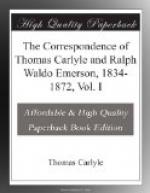As for Concord and New England, alas! my Friend, I should but deface your Idyllion with an ugly contradiction, did I come in such mood as mine is. I am older in years than you; but in humor I am older by centuries. What a hope is in that ever young heart, cheerful, healthful as the morning! And as for me, you have no conception what a crabbed, sulky piece of sorrow and dyspepsia I am grown; and growing, if I do not draw bridle. Let me gather heart a little! I have not forgotten Concord or the West; no, it lies always beautiful in the blue of the horizon, afar off and yet attainable; it is a great possession to me; should it even never be attained. But I have got to consider lately that it is you who are coming hither first. That is the right way, is it not? New England is becoming more than ever part of Old England; why, you are nearer to us now than Yorkshire was a hundred years ago; this is literally a fact: you can come without making your will. It is one of my calculations that all Englishmen from all zones and hemispheres will, for a good while yet, resort occasionally to the Mother-Babel, and see a thing or two there. Come if you dare; I said there was a room, house-room and heart-room, constantly waiting you here, and you shall see blockheads by the million. Pickwick himself shall be visible; innocent young Dickens reserved for a questionable fate. The great Wordsworth shall talk till you yourself pronounce him to be a bore. Southey’s complexion is still healthy mahogany-brown, with a fleece of white hair, and eyes that seem running at full gallop. Leigh Hunt, “man of genius in the shape of a Cockney,” is my near neighbor, full of quips and cranks, with good humor and no common sense. Old Rogers with his pale head, white, bare, and cold as snow, will work on you with those large blue eyes, cruel, sorrowful, and that sardonic shelf-chin:—This is the Man, O Rogers, that wrote the German Poetry in American Prose; consider him well!—But whither am I running? My sheet is done! My Brother John returns again almost immediately to Italy. He has got appointed Traveling Doctor to a certain Duke of Buccleuch, the chief of our Scotch Dukes: an excellent position for him as far as externals go. His departure will leave me lonelier; but I must reckon it for the best: especially I must




